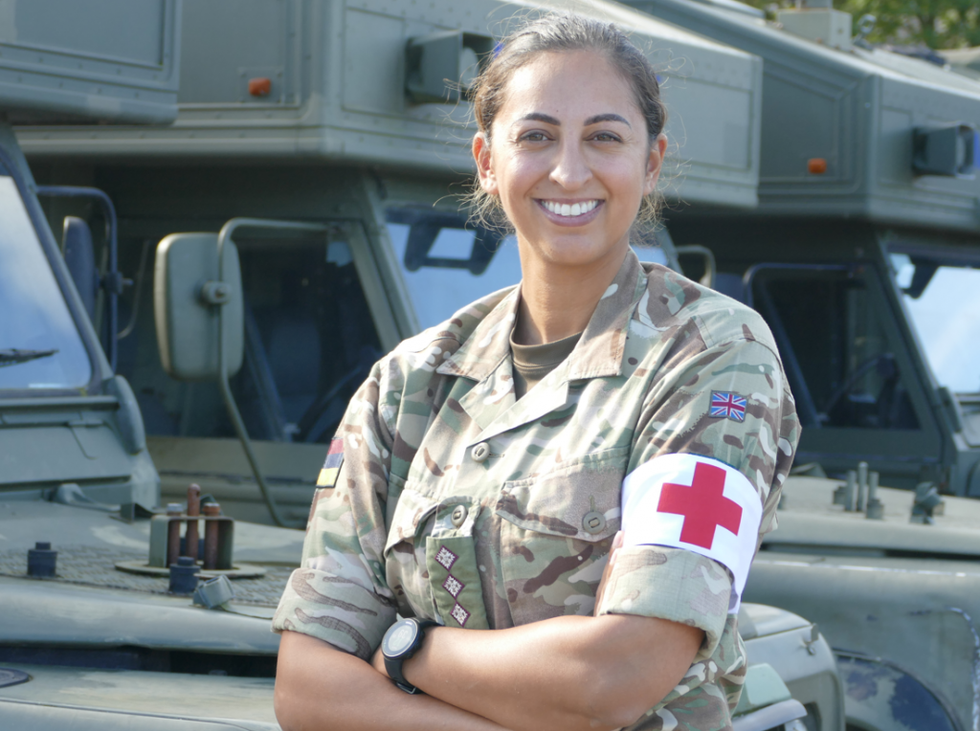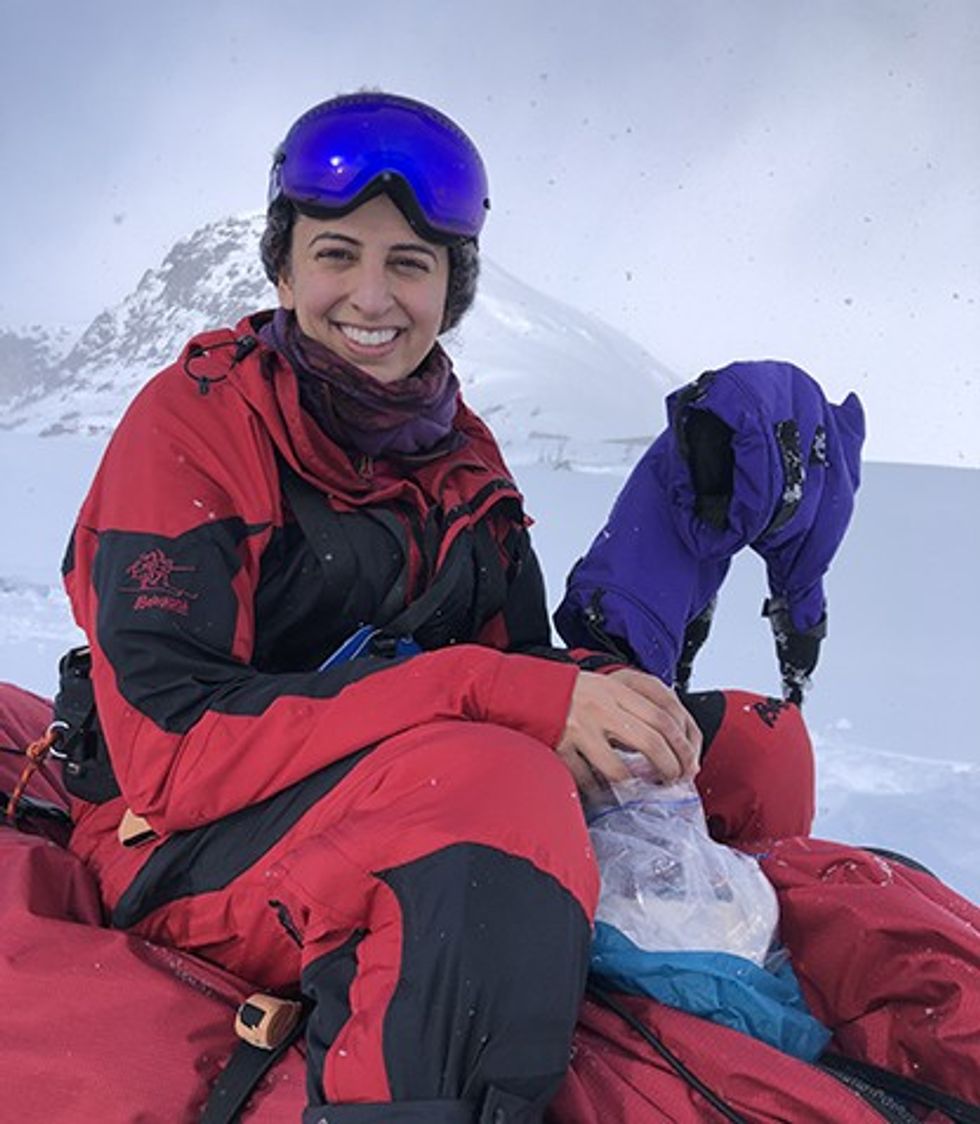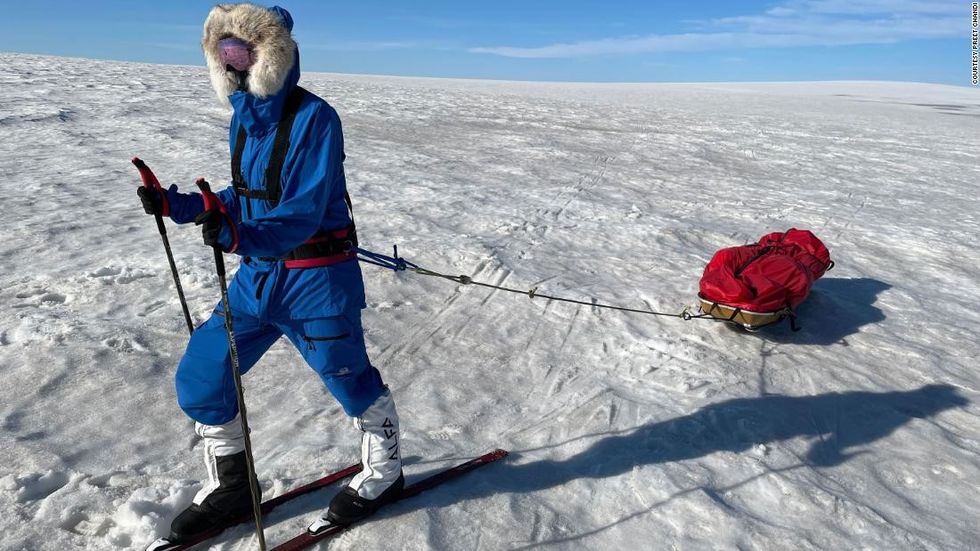DERBY-BORN Captain Preet Chandi, nicknamed Polar Preet, is set to become the first woman of colour to do a solo unsupported trek to the South Pole.
A physiotherapist by profession, the British Army officer flew to Chile on November 7 to begin her onward journey to Antarctica. Last week, she started from Chile to Union Glacier, the base for Antarctica Logistics and Expeditions, to start her trek .
During the gruelling expedition across the ice from the edge of the Antarctic land mass to the South Pole, which should take about 45 days, Preet will brave wind chills and snowstorms while dragging a sled weighing about 95kg, carrying food and fuel for the next 48 days.
In a candid conversation with Eastern Eye prior to her journey, Preet admitted that a trek to South Pole was no walk in the park. After more than two years of training, she feels well prepared – physically and mentally ready for whatever Antarctica might throw at her.
“I am going on a 700-mile solo, unsupported expedition to Antarctica. That means I’ll be completely on my own. Unsupported means I won’t get any outside help once I’ve started. If any of my kit breaks, which hopefully it won’t, I’ll have to fix it on my own,” said the 32-year-old.
“I will probably do just a few hours the first day and then build it up to 10 to 12 hours every day of skiing. I will be taking regular breaks for food, but not for too long, as it starts getting cold if one sits for too long in those circumstances.”
Although the sun will never set, temperatures might dip as low as -50ºC (-58ºF). Her only contact with the outside world will be a daily check-in with her support team.
“I will have a lot of navigational devices with me. I will be constantly tracked and also be in touch with my partner for daily updates. Once I reach the South Pole, I will be picked up and taken back to another camp at the edge, and from there I will be taken back to Chile,” she said.
Preet revealed that she was drawn to endurance-testing adventure activities. She did her first half-marathon aged 20 and took part in some of the world’s most gruelling ultra-marathons, including the six-day Marathon des Sables – a 156-mile race across the sands and salt plains of the Sahara desert.
After she completed that event, she realised she needed a new “big thing” to aim for. Thus the dream of her solo trek to the South Pole was born, despite her having very little skiing experience.
“I wanted to do something big, but did not know what that would be. The reason I came up with Antarctica is I thought, if I do something that pushes me so far out of my comfort zone, outside of my boundaries, hopefully, it’ll inspire other people to do the same, not necessarily the polar expedition but just to push their boundaries,” she told Eastern Eye.
“A lot of the time, especially in my community, it’s those closest to us who sometimes hold us back, because we’re doing something that’s out of the norm or something that’s different.”
Being a woman of colour came with its own set of challenges, Preet said. She was often seen as “odd one out” and the “rebellious” one in her community, often doing things not considered “normal”.
When she was 14, she moved to a tennis academy in Surrey. Two years later, she travelled to the Czech Republic where, as a 16-year-old, she attended tennis training sessions.
Preet said, “It was just a bit of an escape from Derby, and an attempt to remain away from home. I’ve lived all over the place, so I did become quite independent, which probably helped me in not listening to anyone.
“I remember joining the Army at 19 after coming back from the Czech Republic and telling everyone at home afterwards. There were some negative comments, like ‘you have no idea what you’ve done’. I don’t like to explain to others what I am doing.”
“People say the outdoors is for everyone, but if you don’t know anyone from your community or anyone who has done such expeditions, it is not that easy.
“As an Asian woman, as a woman of colour, as someone who is different from others out there, I wanted to do this to break the stereotype. I want to make this normal.”
Citing an example of her adventures setting benchmarks for younger girls in the Indian community, Preet revealed how her nine-yearold niece finds it “normal” that her aunt is going to Antarctica. In a family where even “camping in gardens” was once seen as a crazy exercise, it certainly was a leap of faith.
“I have been doing all these other things which led to what I am about to do now. Becoming an army officer was like breaking the glass ceiling for me. The more you do things, the more you realise what you are capable of. I just want to inspire people to take whatever their first step is,” Preet said.
The Army played a pivotal role in her outlook on life, she said, as she recalled how an recruitment advert showing happy faces caught her attention. She waited a few weeks before she told her family she had joined the Army Reserves, “because it’s something very out of the norm for somebody from my background”.
Preet believes there is still a stigma among British Asian families about joining the armed forces, mainly because people still do not know much about it.
“If one does not know anything, one ends up assuming the worst. That’s why I also do engagement activities to try to inform people about the variety of roles the Army offers. I think people don’t realise the job opportunities and the amazing lifestyle that the Army offers.
“People are sceptical about the Army, especially when it comes to girls, saying, ‘what will people say’, or “the girls are going to be moving away from home’, or ‘how it will be difficult if they are not married’. That’s the narrative I want to change.”
Preet said she loves and feels proud to be a part of the defence forces. After graduating and juggling work as a physiotherapist with her Army Reserve commitments, she decided to join the regular Army in 2012.
Her military duties have taken her to Nepal and Kenya and, most recently, to South Sudan, where she was deployed on a six-month UN peacekeeping tour.
“There are so many opportunities the Army offers in so many fields. Within the system, there are so many things – I was a medical lead for the Army Rugby Sevens. I do some engagement stuff and am also the part of Defence Sikh Society.”
As a trained medic, she was also part of Britain’s Covid-19 vaccination drive. Although the expedition was Preet’s idea, something she planned to do when she was on leave, she now has the full support from the armed forces.
“My trip became an Army expedition about six months ago. Now, I will be on duty while being on the trek to the South Pole. It is good that the Army is backing my expedition, but I would have done it anyway,” she said.
Preet’s training sessions for the trek began just when Covid hit. “Luckily, just before the pandemic took hold, I went for this polar prep course and was able to complete the skiing training session in Norway.
“Then, in August, when we were allowed to travel, I went to Greenland where I did 27 days of training on the ice cap. It was a nightmare, both logistically and financially. The weather was sometimes so bad we had to try hard to not let our tent be buried in the snow. It was definitely the hardest thing I have ever done.
“Bad weather made it worse as flights were delayed. It was mentally very draining.
“The routine in Greenland was very close to what I will be doing in Antarctica. I was mentally and physically exhausted at the end of that trip, but still did the London marathon soon after coming back as I wanted to see how much I could push my limits.”
“I got my master’s results and I got a distinction, so I am pretty happy about that,” she told Eastern Eye.
Her next dream project is creating an “adventure grant”, which will encourage girls and women to go outdoors, test their limits and break barriers.
“I have not planned anything yet, not even thought of a name. Luckily, I will have 45 days to think it over while I am in Antarctica,” she said.
“I have a Go Fund Me page and I have decided to split the money in half – one to support my expedition and one to support the women’s adventure grant.
“I have outdoor brands following me now, so I reckon I can get them to sponsor clothing or gear for the women’s group.
“I want to encourage women from different backgrounds to explore the world through adventure. I hope to be a role model to other women and young girls”.
Preet admitted she was earlier reluctant to be identified as a woman of colour. For a long time, she did not focus on her ethnicity. However, she said she has “grown over the years” and now feels it is important to wear her woman-of-colour badge proudly.
“It took a while for me, but I have embraced it fully now,” she said, adding that it became more important as she could inspire other women of colour and make it easier for future generations.
“The boundaries and barriers I faced, women from similar communities also face. I want to showcase that it is ok to push boundaries and question the things that are told to us.”
Preet wants to inspire people and also hopes to make older generations understand that they have to let younger people, especially girls, “have an uninhibited life” and explore what is out there.
“When I come back, I will try to speak at community centres, temples and other places, especially to older generations, though I understand it is hard to change their mindset. Recently, my aunt asked me when I was getting married, when I am literally going to Antarctica in two weeks,” she said, laughing.
Follow Captain Preet Chandi’s journey at www.polarpreet.com; and on Facebook and Instagram @PolarPreet




















